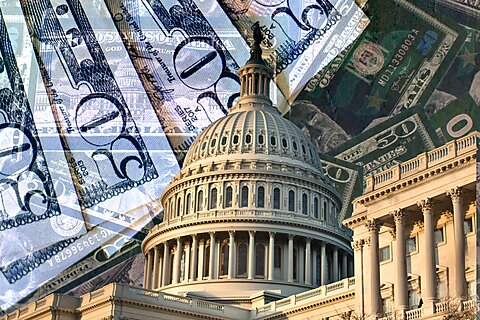Romina Boccia
It’s a positive sign that Congress avoided an unnecessary and wasteful government shutdown this weekend. But the work to responsibly fund the government for the next fiscal year remains. Meanwhile the bigger fiscal challenge – growing debt and rising interest costs – continues to worsen.
As I predicted about six weeks ago, Congress would likely punt on funding the government in full by the statutory deadline of October 1, due to deep divisions over discretionary spending levels, how to fund federal disaster relief accounts, and whether to provide additional emergency spending for Ukraine.
Now they’ve done it, punting this fight to the Friday before Thanksgiving, once again pushing lawmakers up against a holiday deadline. This is an old story in Washington that continues to repeat itself. There’s nothing quite like deadline pressure to persuade legislators to let bad policy slide.
It’s not a completely clean continuing resolution, as Congress added $16 billion in emergency designated spending to shore up federal disaster accounts. This new deficit spending is in addition to the spending caps Congress agreed to in the debt limit deal (FRA, Fiscal Responsibility Act) to primarily cover a pre‐existing Federal Emergency Management Agency (FEMA) budget shortfall that legislators knew about for many months. FEMA’s disaster accounts should be fully budgeted for under existing spending caps, not rely on a separate deficit funding stream because it’s more convenient for Congress to spend more than to cut wasteful and ineffective federal spending in other parts of the budget. Congress once again took the easy way out.
Congress should adhere to the spending caps agreed to in the debt limit deal without phony budget gimmicks and without blowing the budget by designating regular funding as if it were for emergencies.
More importantly, Congress must get serious about addressing the unsustainable growth in the U.S. debt that’s almost entirely driven by increases in health care, Social Security, and interest costs. Just last week, the interest rate on the 10‐year Treasury bond reached 4.5% for the first time since 2007, driving up the cost of federal debt servicing—a debt that’s now as large as the entire U.S. economy and growing at a dangerous rate.
Under current projections, the federal government will seek to borrow in excess of four times the amount of debt, in just the next 30 years, as the United States has borrowed over its entire history ($120 trillion versus $26 trillion in publicly held debt).
While controlling discretionary spending, which funds a declining share (now 27 percent) of the federal government’s activities, is important, the ongoing government funding debate, which will resume in earnest before the November 17 shutdown deadline, is largely symbolic. America’s biggest fiscal challenge lies in the unchecked growth of federal health care and old‐age entitlement programs.
Repeated shutdown fights and continuing resolutions have gotten us no closer to reforming Social Security and Medicare, which are responsible for 95 percent of long‐term unfunded obligations.
A nonpartisan commission, modeled after the successful Base Realignment and Closure Commission (BRAC), is our best hope for reining in unsustainable health care and Social Security spending growth, before a severe debt crisis forces more drastic and painful measures.


























